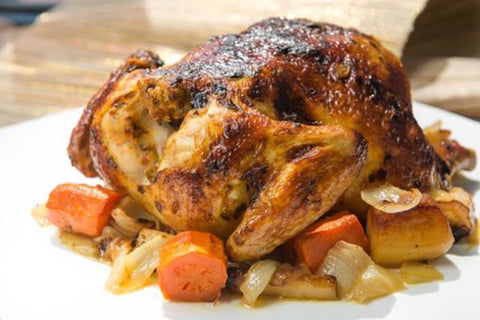The food you eat can impact not only your body but our brain, specifically your sharpness, mood, and cognitive process, studies show. The growing field of nutritional psychiatry is exploring the association between what we eat, how we feel, and how we behave. (Feed any three-year-old sugar and wait ten minutes; they didn’t need a study to tell us food impacts our mood, behavior, and cognitive ability to focus.)
Perhaps the most exciting part of the science points to the fact that antioxidants, those compounds found in plant foods that help fight oxidative stress and reduce the risk of chronic diseases, are now also linked to boosting your brain’s function, your mood, and your cognitive health.
A 2019 report published in the journal Antioxidants examined the link between dietary antioxidants and mental health. Studies show that those adults with depression have “defective antioxidant defenses” meaning they’re low in antioxidants. Moreover, your daily intake of antioxidants such as isoflavonoids and polyphenols (from plants) has been linked to improving move and brain function. Essentially the more antioxidants you eat, the less likely you are to be depressed and the more likely to focus and function highly. While the link between antioxidants and mental disorders isn’t fully understood, eating a diet rich in antioxidants may ease symptoms of mental disorders, and boost your brain’s ability to run well.
The Best Snacks to Eat to Help Fight Feeling Depressed
If you want to boost your mental state–either your mood and your sharpness–try these healthy antioxidant-rich snacks with brain-boosting properties that will not only help you feel more relaxed but also improve your ability to concentrate, focus and think quickly, according to Dr. Uma Naidoo, M.D., a Harvard-trained Nutritional Psychiatrist and the author of the best-selling book This Is Your Brain On Food. One fast fact: salami can lead to depression, wheras healthy foods can power your brain to overcome ADHD, trauma, and mood disorders. Here are five healthy plant-based or vegan snacks that can optimize your brain’s full potential and power more positive thinking right when you need it: today.
1. Eat Beans for brain health and magnesium to fight depression
Studies have shown that magnesium can help lower stress hormones in patients with major depression. But magnesium gets removed from processed foods, so the key is to eat legumes high in magnesium but stay away from processed foods. Dry roasted beans, like garbanzo beans and soybeans, can be baked and eaten like peanuts. “One of my favorite recipes entails cooking chickpeas with a tiny bit of avocado oil and brain-boosting spices like cayenne pepper, turmeric, black pepper, and garlic,” says Dr. Naidoo. “You can substitute cannellini or black beans for this recipe.”
2. Blueberries and other berries for mood-boosting
Blueberries, strawberries, cranberries, and goji berries have some of the greatest amounts of antioxidants around. Berries also contain flavonoids, which have been shown to have mood-boosting properties, according to a study published in Nutrients. In this experiment, children and young adults were asked to drink a flavonoid-rich blueberry juice, and their moods were assessed before and then two hours after the drink was consumed. This blueberry intervention increased positive effect but had no negative effect, meaning no one got crabbier. (Doctors want to further test how flavonoids impact mood positively–until then we’ll just trust our mood-altering benefits of red wine).
“Berries are my personal favorite fruit, says Dr. Naidoo. “They’re lower on the glycemic index and a great option when adding fruit to your daily meal plan. The bright colors of berries represent the polyphenols, which provide that antioxidant boost.” Cheers.
3. Eat dark chocolate for better focus and memory
As surprising as it may seem, dark chocolate with high cocoa content is one of the most nutritious and antioxidant-rich snacks and great for your brain. A study published in Frontiers in Nutrition found a link between flavonoids in cocoa and improvements in general cognition, attention, processing speed, and working memory. (Study break chocolate is real!) Other earlier studies with smaller sample sizes have found similar results with dark chocolate, however there may be other factors at work (such as sugar or fuel). While more research is needed in developing a cause and effect, dark chocolate is high iini flavonoids that are known to be beneficial for brain health.
Dr. Naidoo recommends pairing up a bar of raw dark chocolate with citrus, like an orange, to add Vitamin C, since this can enhance the body’s absorption of the iron in the dark chocolate. “Try to have extra dark chocolate with at least 70% cocoa with low fat and sugar which allows for the benefit of the flavonoid boost,” adds Dr. Naidoo.
4. Leafy Green Vegetables to fight memory loss
Superfoods such as kale, spinach, and arugula can do wonders for your brain, as they are dense in crucial nutrients such as lutein, vitamin K, nitrate, folate, alpha-tocopherol, beta-carotene, and kaempferol that have impressive health benefits. A cup of leafy green vegetables a day can prevent the decline of brain function, according to a 2018 study published in Neurology. Researchers suggest adding half a cup of cooked greens or one cup of raw greens to your daily diet for optimal brain health and to prevent or delay dementia.
One of the best ways to get your greens is to have them as a midday snack, Dr. Naidoo suggests. For raw greens, dress them up with a vegan vinaigrette made with healthy fats such as extra virgin olive oil or avocado. For cooked greens, Dr. Naidoo recommends tossing them with spices. “I love a quick broccolini stir fry tossed with less than a tablespoon of avocado oil, crushed red pepper flakes, fresh minced garlic, and a sprinkle of salt and pepper. This is super quick and easy, plus you get all of the nutrients like brain-boosting folate, capsaicin and so much more. I also switch out taco shells for romaine lettuce cups to add back more greens on Taco Tuesday” Dr. Naidoo says.
5. Add Nuts for Omega 3s, to help you stay sharp and focus
One ounce of walnuts contains 2.5 grams of ALA, the Omega-3 fatty acid that is known to build cell membranes in the body and the brain. Nuts are brain food: A study of 5,000 older adults published in The Journal of Nutrition, Health & Aging, found that consuming10 grams of nuts or more a day is linked to better cognitive functioning, as participants experienced improved thinking, reasoning, and memory. Findings show that eating nuts daily could reduce the risk of cognitive decline and contribute to mental sharpness, especially among adults ages 55+.
“My favorite nuts are Brazilian nuts for the selenium-rich brain-boosting benefit and macadamia nuts, as they are low in omega-6 and high in omega-7,”Dr. Naidoo says. “Walnuts are great too, but they are high in omega-6, so eating them in moderation as part of a healthy meal plan is the way to go. Have a variety of nuts and eat up to ¼ cup a day so that the calories don’t add up!” says Dr. Naidoo.




